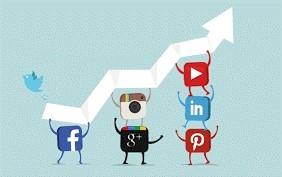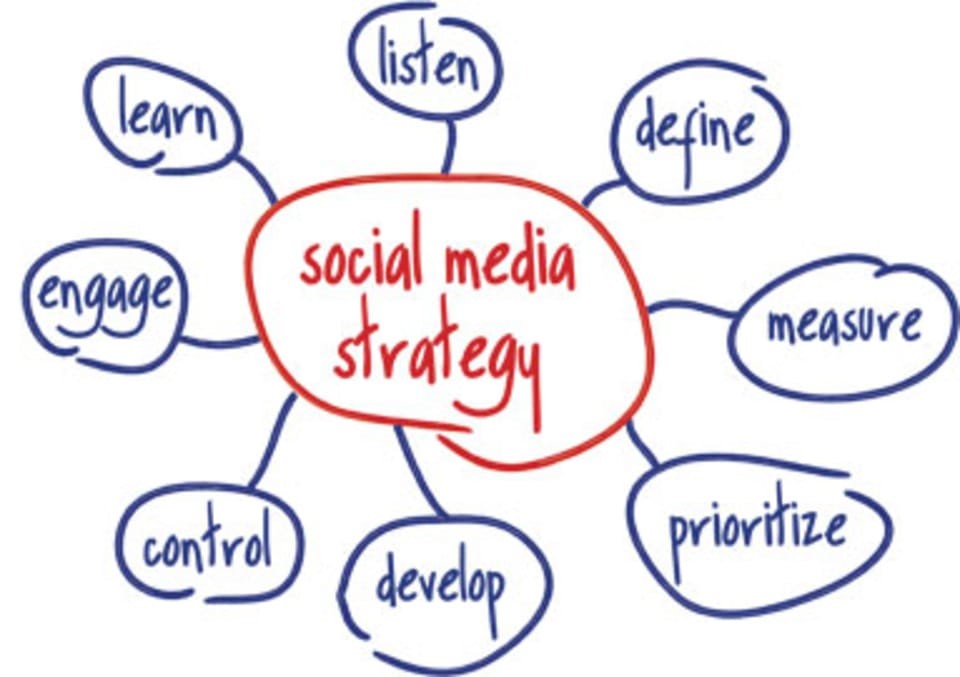With more businesses looking to maintain the connection with their customers via digital means a mid the COVID-19 lockdowns, many are also looking to enhance their social media presence, and ensure that they’re maximizing their engagement opportunities through social apps.
Social media marketing is the use of social media platforms to attach together with your audience to create your brand, increase sales, and drive website traffic. … for instance, Buffer could be a platform of social media management tools, which might facilitate you to achieve success along with your social media marketing.
If you’re on a little marketing team, the only real marketing person at your company or you’re running all facets of your business, you recognize what it’s preferred to wear multiple hats. With countless deliverables to push to stay your small business running, social media marketing can seem to be a non-essential tactic that’s easy to push to the wayside when things get hectic.

We know that folks are spending more and longer on their phones, and plenty of that point is spent on social media apps. We also know that social media users regularly interact with companies they’re inquisitive about or already do business with. So not only is social media free, but your customers and prospects are already there waiting to listen to from you.
social media is one of the most effective ways to attach to those who already love your brand. It’s also important for reaching those that haven’t heard of your business yet.
Getting started with social doesn’t be scary or expensive.

Whether you’re unaccustomed to a social media marketing or a social veteran, you’ll find what you wish here. Just use the table of contents to navigate to your preferred content.
While this guide focuses on small business social media, see our new guide if you’d wish to take a step back and learn all things small business marketing!
Numerous small businesses use social media to repeatedly shove their publicity right into the faces of their customers.
Then, they complain that their social media campaign is simply too noisy, expensive, and time-consuming. They claim that it doesn’t bring sales and thus doesn’t produce a decent ROI for any business. they assert that there’s no point to such a marketing campaign in the least.

No consumer likes to induce bombarded with consistent sales messages. you would like to take a position time in building a relationship along with your audience on their choice of social media platform. That involves engaging with them by posting high-quality content and asking their opinions.
Let me share some stats to indicate why you may be missing out on a golden opportunity to interact along with your audience and reach over one potential customer by abandoning social media.

Social Media For Small Business
Interacting with consumers on social media is a crucial marketing strategy for tiny businesses. Using social media helps you build brand awareness, increase your customer base, and connect with current customers.
In fact, one study revealed a whopping 90% of marketers say social media is vital to their business. Eighty-two percent of survey participants worked in businesses with but 100 employees.
Why Small Businesses Have Social Media Marketing: And Its Advantage
Social media success doesn’t depend on what number of followers a business has. Instead, it depends on customer engagement.
Here are some reasons why small businesses can even have more success in social media than big companies:
1. Small businesses are community and individual focused
There are quite a few differences between big and tiny businesses, like legal structure, the number of employees, and revenue. But, the nitty-gritty aspects of a business aren’t the sole distinctions between big and tiny businesses.
Small businesses tend to be more community and individual-focused. Many small businesses prefer to be heavily involved in their communities, which ends during a very reference to customers. They also enjoy the benefits of joining the chamber of commerce in their community by connecting and sometimes partnering on marketing campaigns with other local businesses.
When using social media, small businesses can connect with their customers online. Small businesses are more likely to reply to their customers than large businesses. As a little business, you’ll easily handle the influx of comments from customers, so confirm your reply quickly.
Social media is additionally an honest way for people to talk about products or services. to extend customer engagement, ask customers to post pictures on social media with the company’s product. And, welcome reviews, questions, comments, and concerns from consumers.
As a little business owner, you’ll easily foster connections with individuals on social media. Current and potential customers will have more respect and appreciation for a business that provides timely responses.

2. More cost-effective advertising
Though you’ll buy some advertising features, like on Facebook, social media is free. you’ll target those advertisements to achieve people within a selected radius of your business. which suggests you don’t end up paying for advertising outside of your local customer base.
To start advertising on Facebook, set a budget, and choose your audience. rather than projection thousands of dollars on social media marketing to succeed across the state, small businesses only should target their locality.
Social media could even be an honest advertising tool without paying for extra features. you’ll be ready to update your followers on promotions, sales, new products, or perhaps just industry-related information. Posting photos also help customers see what you offer.
With social media, you advertise to your current customers. But, you furthermore may advertise to potential customers by getting your brand out there. Your current customers are great brand ambassadors, as well.
Small business owners typically know their customers personally, making it more natural for patrons to share their experiences on social media. Current customers can post about your products or services, bringing your brand on the radar of their network and attracting new people to your business.
3. Joint social media marketing efforts
Multiple small businesses can collaborate on social media marketing strategies. As a little business owner, you’ll work with neighboring small businesses (not competitors) that consider people within your niche.
For example, you’ll post on your Twitter that customers can get a 20% coupon to a completely unique small business if they buy from you and thus the other way around. Or, a team with a neighboring company for a social media giveaway or contest. Winners can get a prize that has products from both businesses. you’ll even showcase your neighboring business’s promotions on your social media sites to entails camaraderie.
By teaming up, you and thus the opposite small business can build brand awareness. you’ll get on the radar of potential customers and encourage individuals to buy for from both businesses.
The best tool by PlagiarismDetector.net is one of the advanced content rephrasing utilities. it is the flexibility to craft highly unique and high readability (reader-friendly) content.
The best tool by PlagiarismDetector.net is one of the advanced content rephrasing utilities. it’s the power to craft highly unique and high readability (reader-friendly) content.
Because of this, consumers know about SBS. In 2016, 112 million consumers shopped on Small Business Saturday. Since consumers recognize the nationwide event, it’s easier for small businesses to use social media to their advantage.
Big businesses might be able to dole out huge amounts of cash for advertising. With Small Business Saturday, you can reap the benefits of mass advertising just by posting that your business will participate.

4. Personalized attention Small businesses are all about personalization.
Why Small Businesses Have the Social Media Marketing Advantage When customers are at your business, you’ll take the time to connect with individuals. you will be able to answer where your products come from, how long your business has been around, and where to procure the inspiration to start your business. Personalized attention isn’t just applicable to consumers who are at your physical business location. On social media, small businesses can give quite scripted responses to customers. A big corporation that sells across the state doesn’t have time to grant a personalized response to each customer. a little business, on the other hand, can write a true response directly addressing the customer’s situation. This direct connection between consumers and kinds gives small businesses social media marketing advantage.
5. Small businesses can piggyback on big advertising
Small Business Saturday (SBS), on a daily basis established in 2010 by American Express, promotes small businesses across the state. If you’re not at home with SBS, it’s a shopping holiday meant to encourage consumers to shop for small. SBS takes place on the Saturday after Thanksgiving. With Small Business Saturday, businesses can piggyback on nationwide social media marketing.

6. Lead with objectives
“Start with your top three marketing objectives, then evaluate how social media may help you achieve them. Too often business owners buy into the idea that ‘I have to be there. I have to be in all these new places or I’ll be left behind.’ But social media has to help you reach your objectives or you’re just wasting time. Don’t think of social media as just a megaphone for your business, but think about how it can help you reach your goals.”
7. Build your authority
“As a business owner, I believe that you can’t over-invest in your LinkedIn presence in 2018. This also applies to anyone looking to further their career or success, particularly those working in sales or marketing. Concentrating on growing audiences and engagement on LinkedIn can absolutely boost sales and conversion rates. It will also lead to amazing opportunities for collaboration.
8. Start a conversation
“The key thing with Facebook is to remember that the algorithm they use rewards posts that have interaction. If a business posts something but no one responds, then Facebook won’t show it to anyone. They’re trying to keep people on their website, and they can only do that by showing posts and stories that people find interesting. It’s going to get more difficult, as Facebook announced they’re going to be changing their algorithm. They’ll now favor content from friends over companies and other pages.
“The key is to ask questions and respond to the answers. A car dealer could post a picture of someone buying their first car and, sure, it’s interesting enough. But if they turn around and ask people, ‘What was your first car?’ they have a chance to get people to answer, and then they can respond. Now, to that person who answered the question, it’s not a car dealer, it’s a car dealer who knows his first car.”
9. Show appreciation
Social media isn’t a monologue where you tell the globe about the awards you’ve won or the special deals on your products and services. If you think that about the ten to twenty most significant people in your business world, social media allows you to acknowledge and thank them for helping you along the way. you’ll be able to thank them by giving recognition to their posts and tweets: like, follow, and share their messages. It’s your way of claiming many thanks. More importantly, they’ll appreciate the gesture and still support your efforts.
10. Have a transparent goal
Know exactly what you’re trying to accomplish: sales, leads, or both? Avoid “dopey” metrics like likes, follows, or impressions. Use Facebook pixel and/or Facebook lead ads so you’ll track and measure results. As a little business owner who advertises on Facebook myself, I measure the ad spend vs. sales or leads generated to see if it’s worthwhile or not—so do you have to.” Gene Marks, small business owner and author who writes daily for The Washington Post and weekly for Forbes.

11. Dominate on one platform
Then pick one social platform and dominate on it one. Claim your profiles on the opposite networks, but focus most of it slow on it one. Listen first. you would like to be ‘friend-raising’ online. I started off (on Twitter) just sharing other people’s content for 6 months. Melinda Emerson, the “Small Biz Lady” and author of the e-book away to Become a Social Media.
12. Create a calendar
“Planning your social media activities will allow you to post consistently—and get more consistent results. you’ll create a method and truly pick up results with less time and energy. you’ll determine which activities to automate and which to assign, whether that’s to an employee or contractor.”
13. Be visual
“Attention spans are short so make sure to feature photos and videos to your social content. If you’ve got a service-based business, consider a photograph with words or a photograph that enhances your text. And don’t overlook visually-oriented platforms like Instagram and Pinterest.” Carol Roth, a billion-dollar deal maker, creator of the longer-term File Legacy Planning System, business advisor, big apple Times bestselling author, and television host and personality.
14. Don’t attempt to pair yourself
“As a tiny low business owner, your time is restricted, so delegate social media work to someone (or a team) in your company, or engage an out of doors expert. Then add the value of your social media strategy to your budget.”
15. Track your company
social media reputation Every social media site represents an excellent place for sharing information about your business. But here’s the key – you’re not the sole one talking about you. others are, too. As you explore the varied social sites, devote it slow to track the reputation of your business. rummage around for what people are saying about you. If the word is positive, take an instant to precise gratitude for the good things people are saying, and vow to stay up the nice work. If it’s negative, rummage around for constructive criticism. Do people’s social comments point to something you’ll do better?
Conclusion
Here’s a way to make the foremost of them all: Begin along with your basic goals. Consider them as you opt on a social strategy, an audience, and an identity. Build out your social presence with an excellent deal of content, both from your own business et al., and share it with impeccable timing. Branch out, explore, interact, and monitor your progress. Social media will help your business grow and thrive – but remember, it takes time and won’t happen overnight.
Want to learn more about how we will facilitate grow your Business Through Social Media with online marketing? Take the primary step & contact us on +91 8157078912 or email us at contact@seogrey.com. You can also chat with us by clicking the following button.
This form is currently undergoing maintenance. Please try again later.







